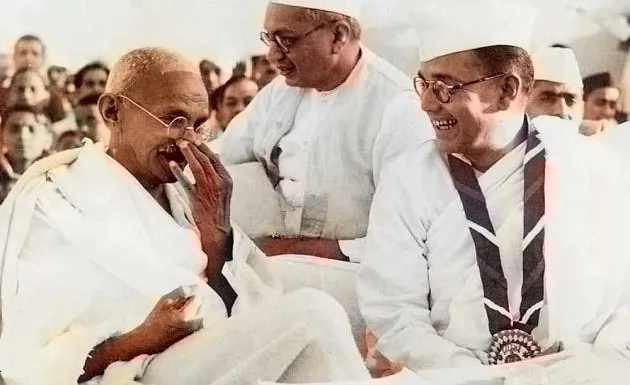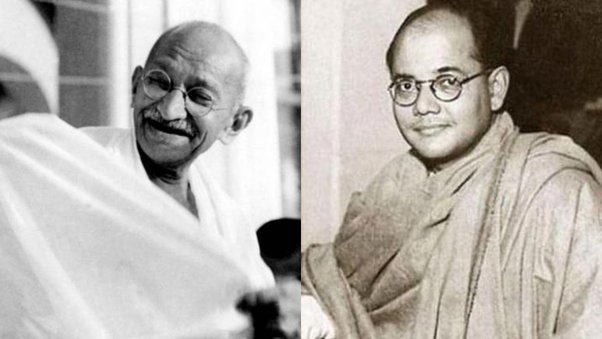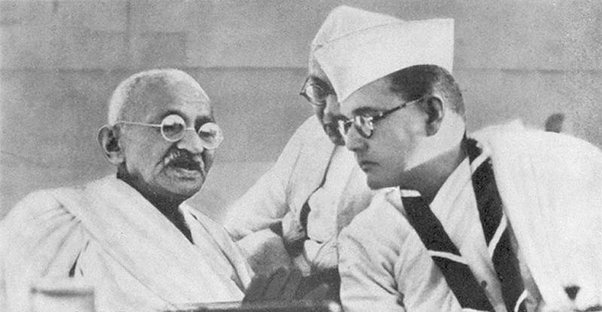Gandhiji and Subhasji are two prominent figures in Indian history who played significant roles in the fight for independence against British colonial rule. Despite having different ideologies and approaches, their contributions and commitment to the freedom struggle are undeniably commendable. Let us delve deeper into the lives of these great leaders and explore their impact on India’s journey towards independence.
Mahatma Gandhi, fondly known as Bapu, was a staunch believer in non-violent resistance, or what he coined as Satyagraha. He emphasized the power of truth, compassion, and love as the means to achieve independence. His philosophy, deeply rooted in Indian spirituality and traditional values, resonated with millions of people across the country. Gandhi’s actions, such as the Salt March, Civil Disobedience Movement, and Quit India Movement, inspired masses to join the struggle against British oppression.
Gandhi’s leadership and unwavering commitment to his principles not only mobilized millions but also influenced numerous other freedom fighters. His principles of Ahimsa (non-violence) and Satyagraha became guiding lights for future movements around the world, including the Civil Rights Movement led by Martin Luther King Jr. in the United States.

On the other hand, Subhas Chandra Bose, also known as Netaji, believed in a more militant approach to gain independence. He rejected the Gandhian philosophy of nonviolence and advocated for armed struggle against the British. Bose initially aligned with the Indian National Congress, but later founded the Forward Bloc, a socialist political group with its military wing, the Indian National Army (INA). Bose believed that the British could only be defeated through force and sought assistance from Axis powers during World War II.
Despite the divergent approaches, both Gandhi and Bose shared a common goal – the liberation of their motherland. Bose’s military campaigns, particularly the INA’s role in Burma and Eastern India, showcased his determination to free India from British rule. Even though the INA did not achieve immediate success, it sparked a sense of nationalism among Indian soldiers who fought alongside the Axis powers.
Though Gandhi and Bose had differing ideologies, they respected each other’s principles and contributed immensely to India’s freedom struggle. Gandhi admired Bose’s dedication and bravery, while Bose held deep respect for Gandhi as a spiritual and political leader.
You can read our another post on National Farmers Day

Tragically, Bose’s life was cut short in a plane crash in 1945, casting a shadow of sorrow over his remarkable contributions. Gandhi, on the other hand, lived to see the dawn of independence in 1947 without witnessing its immediate aftermath. His assassination in 1948 shocked the nation and marked the end of an era.
The legacy left behind by Gandhi and Bose continues to inspire generations of Indians. Their unwavering commitment, different as it may have been, demonstrates the breadth and depth of India’s freedom movement. Both leaders sought to free India from colonial rule and fought tirelessly, each in their own way, to achieve this shared objective.
In conclusion, the stories of Gandhi and Bose epitomize the diversity and unity in India’s fight for independence. Their values, approaches, and contributions have shaped the nation’s history and still serve as beacons of inspiration for those working towards justice, equality, and freedom today. As we reflect on their lives and legacies, it is crucial to remember that the path to independence is paved with diverse ideologies and approaches, but it is the collective goal that unites us all.
More: Wanted to download Odishashop.com visit here

Write A FAQ For Gandhiji and Subhasji
Who was Mahatma Gandhi and Subhas Chandra Bose?
Mahatma Gandhi, often referred to as the Father of the Nation, was a prominent leader of the Indian independence movement against British rule. Subhas Chandra Bose was also a prominent freedom fighter who played a significant role in the independence struggle. He was known for his revolutionary ideas and his determination to free India from colonial rule.
Did Mahatma Gandhi and Subhas Chandra Bose have any ideological differences?
Yes, Mahatma Gandhi and Subhas Chandra Bose had some ideological differences. While Gandhi believed in non-violence and passive resistance as the means to achieve independence, Bose believed in armed struggle and a more aggressive approach. This led to some disagreements between the two leaders, particularly regarding their approaches to the freedom movement.
Did Mahatma Gandhi and Subhas Chandra Bose ever work together?
Although they had differing ideologies, Mahatma Gandhi and Subhas Chandra Bose did work together in the pursuit of independence. Bose initially supported Gandhi’s non-violent movement, but eventually, their differences compelled Bose to form the Forward Bloc, which advocated for a more radical approach to freedom. Despite their differences, both leaders shared a common goal of liberating India from British rule.
What is Mahatma Gandhi’s famous association with the term “Ahimsa”?
Mahatma Gandhi was a strong advocate of ahimsa, which means non-violence or harmlessness. He firmly believed that the path to freedom, justice, and peace could only be achieved through non-violent means. Gandhi’s philosophy of ahimsa became one of the defining pillars of his leadership and contributed significantly to India’s struggle for independence.
What was Subhas Chandra Bose’s role in the freedom movement?
Subhas Chandra Bose played a crucial role in the Indian freedom movement. He was a charismatic leader known for his fiery speeches and revolutionary ideas. Bose was elected as the president of the Indian National Congress in 1939, but his differences with Gandhi and the Congress leadership led him to resign and form the Forward Bloc. Bose then sought support from other countries, including Japan and Germany, to fight against British rule. He believed in armed struggle and formed the Indian National Army (INA) to fight alongside the Axis powers during World War II. Bose’s contribution to India’s independence struggle continues to be remembered and celebrated.
